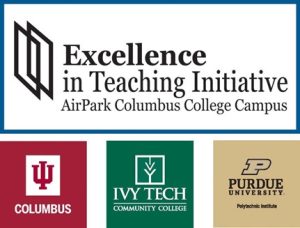Students Who Qualify for Accommodations
Purpose of training
The goal of this session was to demystify the accommodation process and help faculty and staff better understand Accessible Educational Services (AES) and Disability Support Services (DSS). Based on the Americans with Disabilities Act, academic accommodations are modifications, adjustments, aids, and/or services that give a student with a disability an equal opportunity to benefit from the educational process. The list of disabilities that qualify for accommodations is extensive and continues to grow. Accommodations are considered on an individual basis and students choose whether or not to utilize their accommodations.
A more thorough and accurate understanding of accommodations will help minimize confusion and reduce stigma.
Accessible Educational Services Information

Supporting Students Who Qualify for Accommodations (10-2-2024)
Kim Brown (Ivy Tech Community College Columbus)
Matt Rothrock (Indiana University Columbus)
Process to request accommodations:
- Application – provide documentation like IEP, 504, letter from healthcare professional
- Intake (private interview) – IU Columbus uses Accommodate software to submit documentation
- Accommodate sends letter to student
- student is responsible for sharing the letter with faculty members and AES coordinator
- student may submit/resubmit request in subsequent semesters
- Approval – AES Coordinator makes approval decision; accommodations are identified and applied on a case-by-case basis
- Implementation – most confusing step for students and faculty
Student may choose to access approved accommodations for one, all, or none of their classes
Requests for accommodations have generally increased since Covid
Non-traditional, adult students generally self-advocate
Traditional pipeline students may not be accustomed to advocating for themselves since parents/K-12 schools previously did so
Many health conditions are not visible – e.g., diabetes, long Covid, anxiety, depression
Accommodations may include:
- extended exam time (requested by student 48 hours in advance, faculty delivers exam to AES; AES returns completed exam to faculty member)
- extended absences (student arranges with faculty in advance, may be days up to weeks)
- visual and hearing impairment accommodations process takes more time to arrange for equipment, materials, technology, interpreter – involves advance planning and may have a budget impact
Assistive Technology and Accessibility Centers (ATAC) works with UITS to arrange for items like audio books, software, necessary hardware
38% of Ivy Tech students self-identified as needing accommodations
3.82% apply for accommodations
Once application process is complete – students and faculty receive a letter outlining accommodation NOT condition
DSS Director follows up with student and faculty regarding implementation and encourages ongoing conversation
DSS Director routinely speaks to classes/groups to increase awareness of accommodations and encourage more students to request and utilize accommodations as needed
Additional resources
Click the following links to download the additional resources.
